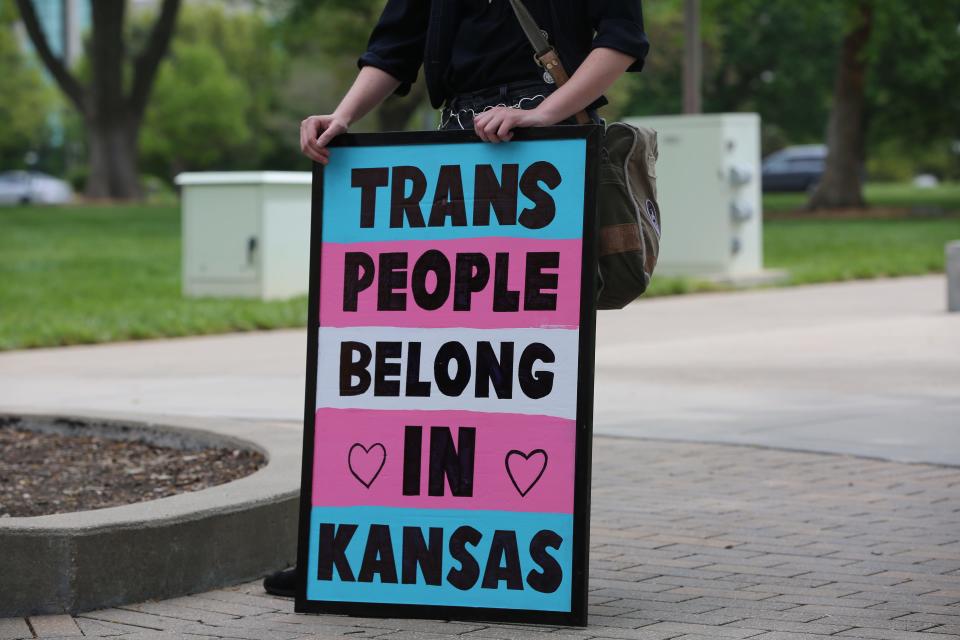Transgender individuals seek to block Kobach-led effort to undo birth certificate changes
- Oops!Something went wrong.Please try again later.
- Oops!Something went wrong.Please try again later.
A group of transgender individuals who forced the state to allow Kansans to change the gender markers on their birth certificates is opposing an effort by Attorney General Kris Kobach to undo that policy in light of a new law that went into effect earlier this month.
The motion, filed Friday afternoon, argued U.S. District Judge Daniel Crabtree should reject Kobach's request as nothing more than an attempt to secure an end-around the existing legally binding agreement to allow for the marker changes.
In 2018, four transgender Kansans filed suit over a policy of former Gov. Sam Brownback's administration not to allow for gender marker changes, arguing it was unconstitutional. When Gov. Laura Kelly took office a year later, her administration entered into a consent decree to allow for the changes and that document was approved by Crabtree.
New filing compares efforts to overturn consent order to Brown v. Board

Last month, Kobach sought to re-open the case in light of Senate Bill 180, which has strict definitions of sex based on biological terms and which transgender individuals believe effectively erases them from state law.
Under Kobach's interpretation of the law, gender marker changes on both birth certificates and driver's licenses are not allowed. The state, he said, could follow the consent decree or SB 180 but not both.
"Now that the legislature has spoken, the agency is bound to execute the law as written," Chief Deputy Attorney General Daniel Burrows wrote.
But attorneys for the transgender individuals argued that it was wrong for a new law to supersede an existing court order, arguing that, under Kobach's logic, there would be nothing stopping a state from passing a law to reimplement a discriminatory policy, even after a court weighed in.
"Is it Attorney General Kobach’s position that the judgment in Brown v. Bd. of Ed. of Topeka may be vacated simply because the Kansas legislature has enacted a law instituting separate educational facilities based on race?" the motion said. "The answer is clearly no."
The consent order, they said, was doing what it was designed to do "by preventing the perpetuation of an unconstitutional policy violating the rights of transgender people born in Kansas."
In his filing, Kobach pointed to a series of court cases where federal judges in such states as Oklahoma have ruled that bans on gender marker changes are allowable. But the attorneys note that none of those cases came in U.S. District Court for Kansas or from the U.S. 10th Circuit Court of Appeals, whose region includes the state.
They also argued the Kansas Department of Health and Environment, which maintains vital statistics and processes birth certificate changes, could comply with both SB 180 and the consent order.
This mirrors an argument made by Gov. Laura Kelly's office, which filed a friend-of-the-court brief last week laying out its own legal beliefs for why the consent order should remain in place.
SB 180 requires state and local agencies that collect vital statistics data to "identify each individual who is part of the collected data set as either male or female at birth."
This language, the attorneys for the transgender individuals argue, does not specifically prohibit gender marker changes, only that a record be on file to reflect a person's sex assigned at birth.
New filing comes amid state battle over driver's license changes
The federal court battle comes amid a parallel fight in state court, where Kobach is seeking to force the Kelly administration to ban gender marker changes on driver's licenses.
Last week, a Shawnee County judge ruled the state had to cease allowing gender marker changes for the time being. Kobach's office has already requested a longer-lasting injunction on the practice; a hearing on that issue has not been scheduled but is expected to be in the coming days.
Currently, the consent order remains in effect, meaning transgender individuals are able to change the gender marker on their birth certificate but not their driver's license. How long that arrangement will remain in effect is unclear.
This article originally appeared on Topeka Capital-Journal: Kansas trans individuals oppose Kris Kobach birth certificate effort

